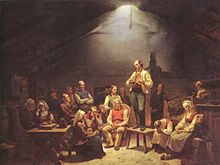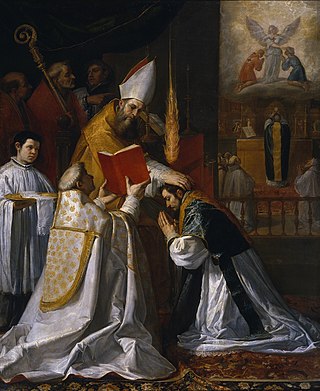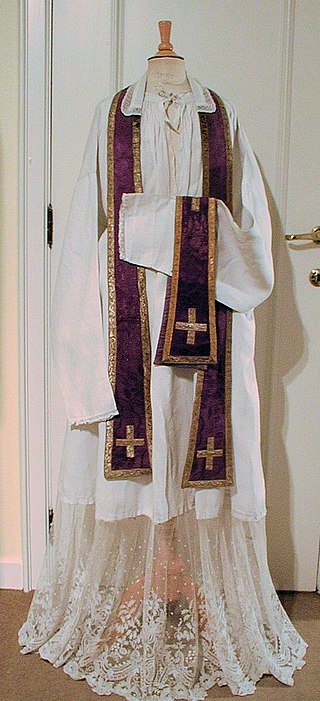
A lay preacher is a preacher who is not ordained (i.e. a layperson) and who may not hold a formal university degree in theology. Lay preaching varies in importance between religions and their sects.

A lay preacher is a preacher who is not ordained (i.e. a layperson) and who may not hold a formal university degree in theology. Lay preaching varies in importance between religions and their sects.
Some denominations specifically discourage or disallow lay ministers or lay preachers from assuming certain titles. For example, the Unitarian Universalist Association reserves the title of "the reverend" for ordained ministers. [1]
The United Methodist Church authorized the role of "certified lay minister" (CLM) at its 2004 General Conference as a non-clergy leadership role, stating that CLMs should not use the title of "pastor"; be addressed as "reverend"; or wear clerical garb (i.e., the robe, stole or collar). [2]
Lay ecclesial ministry is a similar practice in the Catholic Church. Lay ecclesial ministers serve the church in many ways, assisting priests, but are not ordained.
Specific groups of lay preachers, and other groups that encourage lay preachership, include:
A bishop is an ordained member of the clergy who is entrusted with a position of authority and oversight in a religious institution. In Christianity, bishops are normally responsible for the governance and administration of dioceses. The role or office of the bishop is called episcopacy. Organizationally, several Christian denominations utilize ecclesiastical structures that call for the position of bishops, while other denominations have dispensed with this office, seeing it as a symbol of power. Bishops have also exercised political authority within their dioceses.

In certain Christian denominations, holy orders are the ordained ministries of bishop, priest (presbyter), and deacon, and the sacrament or rite by which candidates are ordained to those orders. Churches recognizing these orders include the Catholic Church, the Eastern Orthodox, Oriental Orthodox, Anglican, Assyrian, Old Catholic, Independent Catholic and some Lutheran churches. Except for Lutherans and some Anglicans, these churches regard ordination as a sacrament.

A deacon is a member of the diaconate, an office in Christian churches that is generally associated with service of some kind, but which varies among theological and denominational traditions.

A pastor is the leader of a Christian congregation who also gives advice and counsel to people from the community or congregation. In Lutheranism, Catholicism, Eastern Orthodoxy, Oriental Orthodoxy and Anglicanism, pastors are always ordained. In Methodism, pastors may be either licensed or ordained.

Ordination is the process by which individuals are consecrated, that is, set apart and elevated from the laity class to the clergy, who are thus then authorized to perform various religious rites and ceremonies. The process and ceremonies of ordination vary by religion and denomination. One who is in preparation for, or who is undergoing the process of ordination is sometimes called an ordinand. The liturgy used at an ordination is commonly found in a book known as an Ordinal which provides the ordo for celebrations.
In religious organizations, the laity consists of all members who are not part of the clergy, usually including any non-ordained members of religious orders, e.g. a nun or a lay brother. In both religious and wider secular usage, a layperson is a person who is not qualified in a given profession or does not have specific knowledge of a certain subject. The phrase "layman's terms" is used to refer to plain language that is understandable to the everyday person, as opposed to specialised terminology understood only by a professional.
A Methodist local preacher is a layperson who has been accredited by the Methodist Church to lead worship and preach on a frequent basis. With separation from the Church of England by the end of the 18th century, a clear distinction was recognised between itinerant preachers and the local preachers who assisted them. Local preachers have played an important role in Methodism since the earliest days of the movement, and have also been important in English social history. These preachers continue to serve an indispensable role in the Methodist Church of Great Britain, in which the majority of church services are led by laypeople. In certain Methodist connexions, a person becomes a local preacher after obtaining a license to preach. In many parts of Methodism, such as the Allegheny Wesleyan Methodist Connection, there are thus two different tiers of ministers—licensed preachers and ordained elders.

The stole is a liturgical vestment of various Christian denominations, which symbolizes priestly authority; in Protestant denominations which do not have priests but use stoles as a liturgical vestment, however, it symbolizes being a member of the ordained. It consists of a band of colored cloth, usually of silk, about seven and a half to nine feet long and three to four inches wide, whose ends may be straight or may broaden out in the shape of a spade or bell. The center of the stole is worn around the back of the neck and the two ends hang down parallel to each other in front, either attached to each other or hanging loose. The stole is almost always decorated in some way, usually with two crosses, or sometimes another significant religious design. It is often decorated with contrasting galloons and fringe is usually applied to the ends of the stole following Numbers 15:38–39. A piece of white linen or lace may be stitched onto the back of the collar as a sweat guard, which can be replaced more cheaply than the stole itself.

In Christianity, a minister is a person authorised by a church or other religious organization to perform functions such as teaching of beliefs; leading services such as weddings, baptisms or funerals; or otherwise providing spiritual guidance to the community. The term is taken from Latin minister. In some church traditions the term is usually used for people who have been ordained, but in other traditions it can also be used for non-ordained.

In some Christian denominations, a reader or lector is the person responsible for reading aloud excerpts of scripture at a liturgy. In early Christian times the reader was of particular value due to the rarity of literacy.

The Universalist Church of America (UCA) was originally a Christian Universalist religious denomination in the United States. Known from 1866 as the Universalist General Convention, the name was changed to the Universalist Church of America in 1942. In 1961, it consolidated with the American Unitarian Association to form the Unitarian Universalist Association.

The Anglican ministry is both the leadership and agency of Christian service in the Anglican Communion. Ministry commonly refers to the office of ordained clergy: the threefold order of bishops, priests and deacons. Anglican ministry includes many laypeople who devote themselves to the ministry of the church, either individually or in lower/assisting offices such as lector, acolyte, sub-deacon, Eucharistic minister, cantor, musicians, parish secretary or assistant, warden, vestry member, etc. Ultimately, all baptized members of the church are considered to partake in the ministry of the Body of Christ.
Youth ministry, also commonly referred to as youth group, is an age-specific religious ministry of faith groups or other religious organizations, usually from ages 12 to 30, whose mission is to involve and engage with young people who attend their places of worship, or who live in their community. Christian youth ministry usually encompasses one or more of the following:
A lay leader is a member of the laity in any congregation who has been chosen as a leader either by their peers or the leadership of the congregation. In most denominations, lay leadership is not an ordained clerical office, and the lay leader's responsibilities vary according to the particular tradition of the congregation. Some organizations do not allow the lay leader to give sacraments for example, but do allow them to perform most other portions of the service that are normally the responsibility of the clergy.
In Christianity, an elder is a person who is valued for wisdom and holds a position of responsibility and authority in a Christian group. In some Christian traditions an elder is an ordained person who serves a local church or churches and who has been ordained to a ministry of word, sacrament and order, filling the preaching and pastoral offices. In other Christian traditions, an elder may be a lay person serving as an administrator in a local congregation, or be ordained and serving in preaching or pastoral roles. There is a distinction between ordained elders and lay elders. The two concepts may be conflated in everyday conversation. In non-Christian world cultures the term elder refers to age and experience, and the Christian sense of elder is partly related to this.

All Souls Unitarian Church is a Unitarian Universalist (UU) church in Tulsa, Oklahoma. It is one of the largest UU congregations in the world.

In Christianity, the ordination of women has been taking place in an increasing number of Protestant and Old Catholic churches, starting in the 20th century. Since ancient times, certain churches of the Orthodox tradition, such as the Coptic Orthodox Church, have raised women to the office of deaconess. While ordination of women has been approved in many denominations, it is a very controversial and divisive topic.

The Universalist Unitarian Church is a historic church at the intersection of Silver Street and Elm Street in Waterville, Maine in the United States. Built in 1832 for a Universalist congregation founded in 1826, it is a prominent local example of transitional Federal-Gothic Revival architecture. It was listed on the National Register of Historic Places in 1978.
Lay ministry is a term used for ministers of faiths in Christian denominations who are not ordained in their faith tradition. Lay ministers are people who are elected by the church, full-time or part-time. They may have theological degrees and training, which may be required in certain instances, but not all lay ministries require this qualification. Lay ministers are generally chosen in small communities where it is difficult to find professional clergy to serve roles, and in which lay ministers are appropriate to fulfill the pastoral duties. In most Protestant churches, deacons, Sunday School teachers, youth ministers, and praise teams are considered lay ministry positions.

First Parish in Malden, Universalist is a Unitarian Universalist ("UU") church in Malden, Massachusetts and a member congregation of the Unitarian Universalist Association. It was gathered in 1648 to support the establishment of the city of Malden. It is one of the oldest churches in Massachusetts. The current minister is the Rev. Otto O'Connor, who was called to be the congregation's minister in 2017.
Be aware that the title "Reverend" applies to ministers who have been. Some ministers are in candidate status, or otherwise have not earned the "Rev." title.